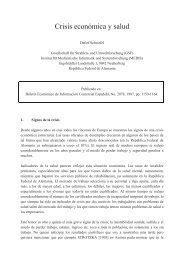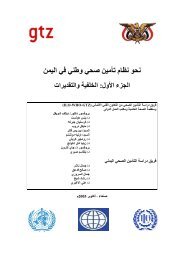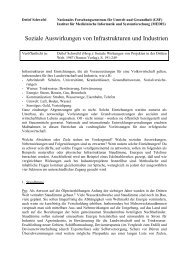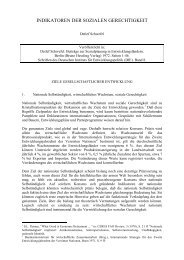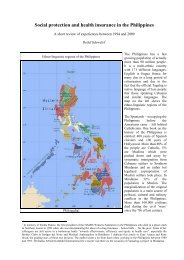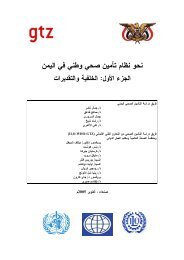Towards a national health insurance system in ... - Detlef Schwefel
Towards a national health insurance system in ... - Detlef Schwefel
Towards a national health insurance system in ... - Detlef Schwefel
You also want an ePaper? Increase the reach of your titles
YUMPU automatically turns print PDFs into web optimized ePapers that Google loves.
<strong>Towards</strong> a <strong>national</strong> <strong>health</strong> <strong><strong>in</strong>surance</strong> <strong>system</strong> <strong>in</strong> Yemen – Part 1: Background and assessments 13<br />
However, the political development on the <strong>national</strong> level stands <strong>in</strong> contrast to strong tribal affiliations,<br />
s<strong>in</strong>ce tribal identifications are still socially and politically relevant today (World Bank 2002a). Tribes<br />
have been a basic element of the social structure of Yemen for thousands of years, and rema<strong>in</strong><br />
important even today. Many regions, ma<strong>in</strong>ly the North East and the surround<strong>in</strong>gs of Sana’a have a<br />
strong presence of tribal hierarchies and are characterised by tribal sett<strong>in</strong>gs. The southern part of the<br />
country has a long welfare history, and the region of the former British colony and capital of<br />
socialistic South Yemen, Aden, is the most modern part of country. And the West shows the widest<br />
openness towards different socio-political options. 3<br />
Tribes are political units based on a particular region, with fixed borders, and a known number of<br />
members. Tribal affiliation is especially important for those <strong>in</strong> former North Yemen, which comprises<br />
nearly two-thirds of the population. The tribes have often been <strong>in</strong> conflict with one another, but more<br />
recently have begun to band together for mutual support aga<strong>in</strong>st the central government. Tribal<br />
organisations have a certa<strong>in</strong> amount of political autonomy with which it <strong>in</strong>teracts with other tribes and<br />
with the central government. Some of them see the government as threaten<strong>in</strong>g tribal autonomy as well<br />
as traditional life and values. Great regional differences exist even with<strong>in</strong> the tribal community, and<br />
many urban Yemenis regard tribes and tribalism as backwards and primitive (State Department 2005).<br />
For many centuries, Yemen was widely isolated, and <strong>in</strong> many regions traditional economic activities<br />
and social structure rema<strong>in</strong>ed nearly unchanged until the 1960ies. Modernisation <strong>in</strong> the last half<br />
century has brought new technologies and gradual open<strong>in</strong>g of the society, but the social structure has<br />
survived with little changes, and is reflected <strong>in</strong> the shape and scope of social services. Today, Yemen<br />
is considered one of the least developed countries <strong>in</strong> the world. About 70 % of the population live <strong>in</strong><br />
rural areas, most of them <strong>in</strong> poverty and lack<strong>in</strong>g access to the most elementary social services. The<br />
<strong>health</strong> care <strong>system</strong> is relatively recent and has developed only dur<strong>in</strong>g the last decades. Confidence <strong>in</strong><br />
local providers is still low, and the better-off tend to search care outside the country. This attitude is<br />
still deeply rooted although meanwhile a considerable network of <strong>health</strong> care providers has emerged.<br />
Nowadays, Yemen disposes of a heterogeneous mix of public and private physicians, pharmacies,<br />
<strong>health</strong> posts, <strong>health</strong> centres, cl<strong>in</strong>ics, hospitals, etc.<br />
However, reasonable and effective <strong>health</strong> <strong><strong>in</strong>surance</strong> schemes are still very scarce, and experience with<br />
regard to <strong>health</strong> care f<strong>in</strong>anc<strong>in</strong>g is lack<strong>in</strong>g. The m<strong>in</strong>istry is currently <strong>in</strong>troduc<strong>in</strong>g a pilot scheme of<br />
community-based <strong>health</strong> <strong><strong>in</strong>surance</strong> and is will<strong>in</strong>g to <strong>in</strong>troduce a comprehensive <strong>national</strong> <strong>system</strong> of<br />
<strong>health</strong> <strong><strong>in</strong>surance</strong>. Inter<strong>national</strong> experience suggests that it is highly recommendable to adapt social<br />
policy measures as far as possible to the given situation <strong>in</strong> a country. It depends on a series of factors<br />
whether a nationwide <strong>health</strong> <strong><strong>in</strong>surance</strong> <strong>system</strong> as such offers a realistic option, and sometimes<br />
decentralised, community-based or workplace-l<strong>in</strong>ked schemes have better chances to be implemented<br />
successfully and then extended to other population groups. One of the most important factors with<br />
regard to the implementation or extension of any <strong>health</strong> <strong><strong>in</strong>surance</strong> scheme is the operative and<br />
f<strong>in</strong>ancial feasibility. And creat<strong>in</strong>g exaggerated expectations with regard to the benefits or population<br />
share covered can be suicidal for a new <strong>health</strong> <strong><strong>in</strong>surance</strong> scheme.<br />
After recent WHO consultation made <strong>in</strong> October 2003, a Social Health Insurance Law proposal was<br />
presented to the government <strong>in</strong> February 2004, but postponed for further reflection. Part of the<br />
government, ma<strong>in</strong>ly <strong>in</strong> the M<strong>in</strong>istry of F<strong>in</strong>ance and the M<strong>in</strong>ister of Social Affairs and Labour, fear<br />
Yemen and the <strong>health</strong> sector <strong>in</strong> general is not yet ready for implement<strong>in</strong>g a <strong>national</strong> <strong>health</strong> <strong><strong>in</strong>surance</strong><br />
<strong>system</strong>. The draft law seemed premature and <strong>in</strong>complete for provid<strong>in</strong>g a viable and applicable<br />
framework for the development of social security, <strong>in</strong>clud<strong>in</strong>g <strong>health</strong> <strong><strong>in</strong>surance</strong> for civil servants and<br />
employees <strong>in</strong> the formal sector, based on contributions or other methods of f<strong>in</strong>anc<strong>in</strong>g.<br />
3 Oral communication by Thabet Bagash, Programme Development Officer of Oxfam.





